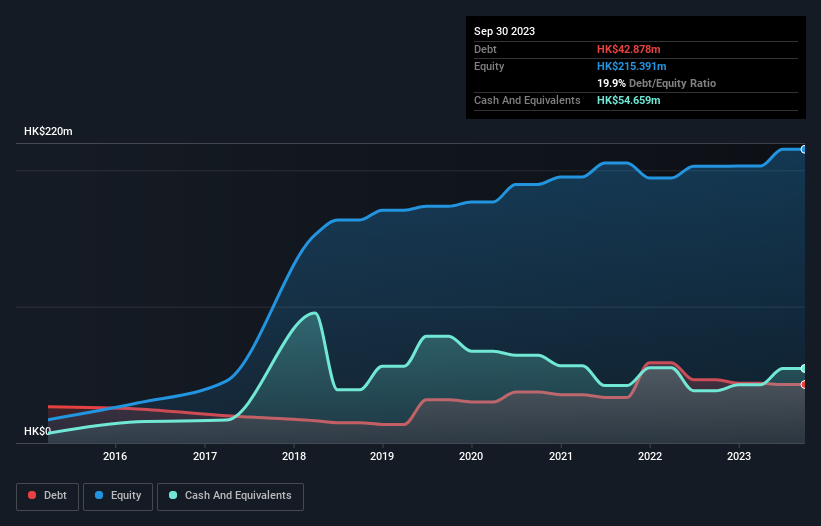- Hong Kong
- /
- Oil and Gas
- /
- SEHK:1621
Vico International Holdings (HKG:1621) Seems To Use Debt Rather Sparingly
The external fund manager backed by Berkshire Hathaway's Charlie Munger, Li Lu, makes no bones about it when he says 'The biggest investment risk is not the volatility of prices, but whether you will suffer a permanent loss of capital.' It's only natural to consider a company's balance sheet when you examine how risky it is, since debt is often involved when a business collapses. Importantly, Vico International Holdings Limited (HKG:1621) does carry debt. But should shareholders be worried about its use of debt?
When Is Debt Dangerous?
Generally speaking, debt only becomes a real problem when a company can't easily pay it off, either by raising capital or with its own cash flow. Ultimately, if the company can't fulfill its legal obligations to repay debt, shareholders could walk away with nothing. However, a more usual (but still expensive) situation is where a company must dilute shareholders at a cheap share price simply to get debt under control. Of course, debt can be an important tool in businesses, particularly capital heavy businesses. When we think about a company's use of debt, we first look at cash and debt together.
See our latest analysis for Vico International Holdings
What Is Vico International Holdings's Debt?
As you can see below, Vico International Holdings had HK$42.9m of debt at September 2023, down from HK$46.4m a year prior. But it also has HK$54.7m in cash to offset that, meaning it has HK$11.8m net cash.

How Strong Is Vico International Holdings' Balance Sheet?
We can see from the most recent balance sheet that Vico International Holdings had liabilities of HK$61.9m falling due within a year, and liabilities of HK$2.29m due beyond that. Offsetting these obligations, it had cash of HK$54.7m as well as receivables valued at HK$48.8m due within 12 months. So it can boast HK$39.3m more liquid assets than total liabilities.
This surplus liquidity suggests that Vico International Holdings' balance sheet could take a hit just as well as Homer Simpson's head can take a punch. Having regard to this fact, we think its balance sheet is as strong as an ox. Simply put, the fact that Vico International Holdings has more cash than debt is arguably a good indication that it can manage its debt safely.
Better yet, Vico International Holdings grew its EBIT by 102% last year, which is an impressive improvement. That boost will make it even easier to pay down debt going forward. When analysing debt levels, the balance sheet is the obvious place to start. But you can't view debt in total isolation; since Vico International Holdings will need earnings to service that debt. So if you're keen to discover more about its earnings, it might be worth checking out this graph of its long term earnings trend.
Finally, while the tax-man may adore accounting profits, lenders only accept cold hard cash. While Vico International Holdings has net cash on its balance sheet, it's still worth taking a look at its ability to convert earnings before interest and tax (EBIT) to free cash flow, to help us understand how quickly it is building (or eroding) that cash balance. During the last three years, Vico International Holdings generated free cash flow amounting to a very robust 98% of its EBIT, more than we'd expect. That puts it in a very strong position to pay down debt.
Summing Up
While it is always sensible to investigate a company's debt, in this case Vico International Holdings has HK$11.8m in net cash and a decent-looking balance sheet. And it impressed us with free cash flow of HK$18m, being 98% of its EBIT. At the end of the day we're not concerned about Vico International Holdings's debt. When analysing debt levels, the balance sheet is the obvious place to start. However, not all investment risk resides within the balance sheet - far from it. Case in point: We've spotted 2 warning signs for Vico International Holdings you should be aware of.
At the end of the day, it's often better to focus on companies that are free from net debt. You can access our special list of such companies (all with a track record of profit growth). It's free.
New: Manage All Your Stock Portfolios in One Place
We've created the ultimate portfolio companion for stock investors, and it's free.
• Connect an unlimited number of Portfolios and see your total in one currency
• Be alerted to new Warning Signs or Risks via email or mobile
• Track the Fair Value of your stocks
Have feedback on this article? Concerned about the content? Get in touch with us directly. Alternatively, email editorial-team (at) simplywallst.com.
This article by Simply Wall St is general in nature. We provide commentary based on historical data and analyst forecasts only using an unbiased methodology and our articles are not intended to be financial advice. It does not constitute a recommendation to buy or sell any stock, and does not take account of your objectives, or your financial situation. We aim to bring you long-term focused analysis driven by fundamental data. Note that our analysis may not factor in the latest price-sensitive company announcements or qualitative material. Simply Wall St has no position in any stocks mentioned.
About SEHK:1621
Vico International Holdings
An investment holding company, engages in the distribution of lubricants and petrochemicals in Hong Kong, Vietnam, Dubai, Thailand, Singapore, and India.
Flawless balance sheet and slightly overvalued.
Market Insights
Community Narratives



